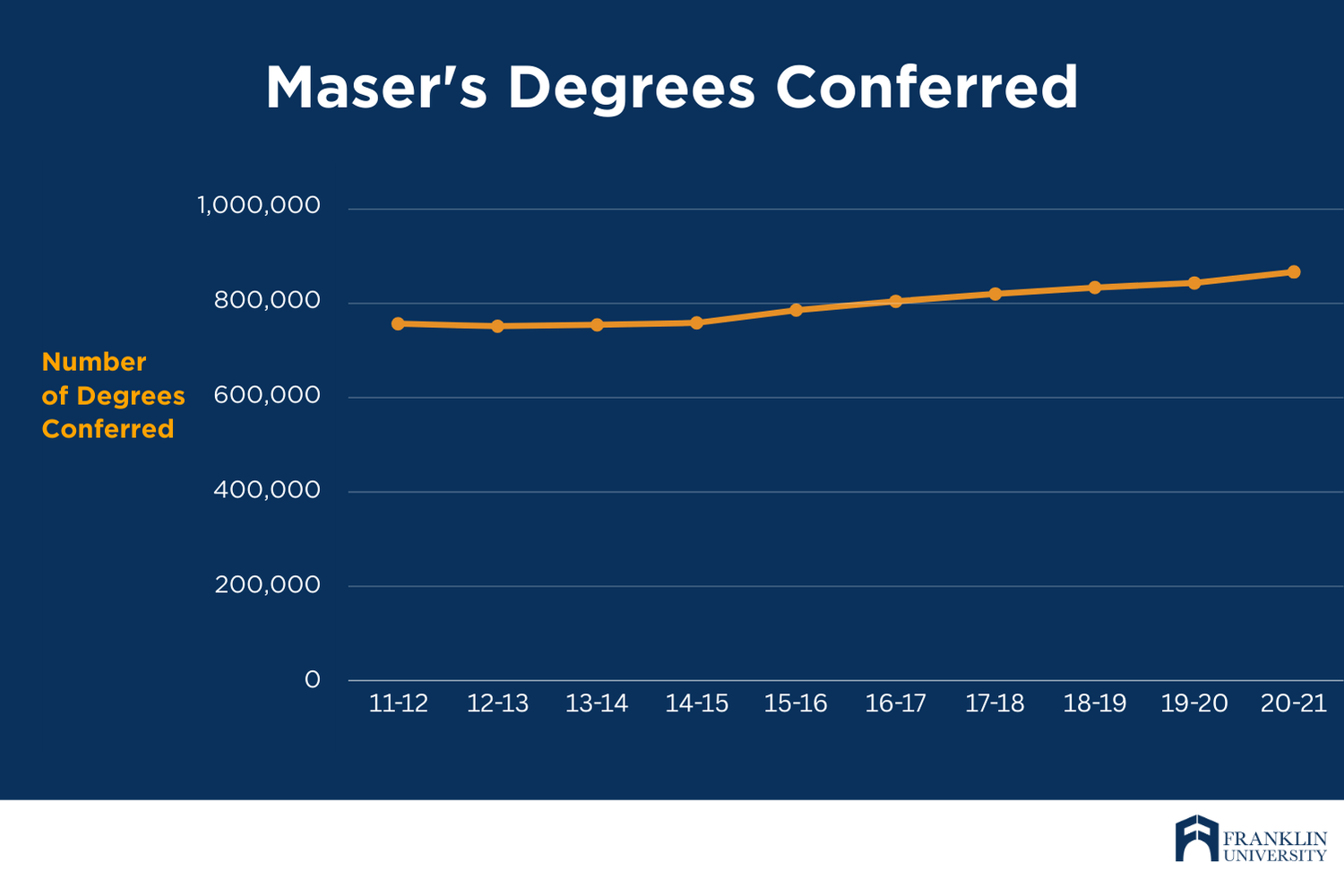Request Information
We're Sorry
There was an unexpected error with the form (your web browser was unable to retrieve some required data from our servers). This kind of error may occur if you have temporarily lost your internet connection. If you're able to verify that your internet connection is stable and the error persists, the Franklin University Help Desk is available to assist you at helpdesk@franklin.edu, 614.947.6682 (local), or 1.866.435.7006 (toll free).
Just a moment while we process your submission.

Is a Master’s Degree Right for Me? 7 Reasons Why It May Be the Right Time
Just because you think you should get a master’s degree doesn’t mean now is the right time. On the other hand, now could be the exact right time to earn your master’s.
But how do you know? How can you hurry up your “aha moment” so you know if you should enroll in a master’s degree program now or later?
The key is to get clear about master’s degrees, including whether or not they’re worth it to you and your career. That’s why it can help if you spend a little time taking a closer look at the benefits of earning a master’s, including trends that could impact master’s degree completions.
And before you decide if a master’s is right for you right now, be sure to take stock of whether a master’s degree is necessary in your field, required by your employer or helpful in reaching your career goals.
Is Getting a Master’s Degree Important?
In today’s complex and interconnected marketplace, there’s hardly an employer who isn’t looking for people with deep expertise in an area relevant to business. And there’s hardly an employer who isn’t in need of professionals who have the communication and leadership skills needed to move their organizations forward.
This one-two punch of expertise and leadership is exactly what a master’s degree is designed to give you. So, it’s hardly a surprise that a lot of people continue to earn a master’s degree. In fact, the National Center for Education Statistics (NCES) reports that more than 866,000 people earned their master’s-level degree in the 2020-2021 academic year alone.

What matters most when choosing a master’s program? Compare features, benefits and cost to find the right school for you.
Not everyone wants or needs to earn a master’s degree. But, there’s no denying that a master’s degree is important based on employer demand and the steady increase of master’s degree completions.
But, earning a master’s can take time, energy and dollars, so it’s important to make sure you’ve got your timing right. It’s also important that you make the decision based on all the right reasons, so here are seven of them.
Is a Master’s Degree Right for Me? 7 Reasons Why It May Be the Right Time for You
1: You want to become an expert in your field.
A master’s degree is a credential that proves you know your stuff. A master’s is evidence of your knowledge of a subject matter or area and, unlike a bachelor’s degree that focuses on breadth of knowledge through general education, major and elective courses, a master’s degree is all about acquiring depth of knowledge in a specific area.
“A master’s degree allows you to focus on field-related material,” says Jonathan McCombs, Ph.D., dean of the College of Health and Public Administration at Franklin University. “With a master’s you combine theory with practice, as well as develop higher level writing and communication skills, which are so important in today’s world.”
McCombs explains that a master’s degree also lets you take a deep dive into research through the current body of knowledge surrounding the complex issues and challenges in your particular field.
“Master’s degree students learn how to employ a pragmatic approach to the available body of work,” he explains. “When you enroll in a master’s degree program, your new knowledge better equips you to identify, develop and implement solutions to complex problems.”
2: You need to deepen your leadership skills.
Developing and strengthening leadership skills never stops–there’s always more to learn. Of course, you’ve probably gained most of your leadership skills through first-hand experience in areas like relationship building, evaluating organizations, strategic problem solving and people management. But, a master’s degree does something that on-the-job experience cannot: It speeds up the process by helping you learn from the successes and mistakes of others.
“Learning about leadership from those who have extensive real-world experience is incredibly valuable,” says Dr. McCombs. “The instructors of our leadership courses typically come from higher-level leadership positions, so they’re able to share with students the critical nuances of leadership that are more difficult to learn through theoretical knowledge or in the students’ workplace. During the master’s degree program, students learn and benefit from their instructors’ past mistakes without having to make those same mistakes for themselves. They also benefit from their instructors’ professional successes and learn to apply both kinds of lessons in their own careers.”
3: You’re ready to learn new skills to become the best person for the job.
Big data, technology and globalization continue to rock the world of business and industry. Some organizations are more impacted than others. That means there are new positions being created and others being obsoleted.
A master’s degree could be right for you right now if you’re ready to update your skills to keep up with the pace of this change. You can expect a master’s degree to:
- Give you deeper insight into the greatest challenges facing your field
- Introduce you to the newest tools, technologies and methodologies so you can seize early opportunities in your industry
- Help you become a better, more effective communicator, collaborator and decision maker
“Learning new skills is only part of the master’s degree equation,” says Dr. McCombs. “Developing the ability to continuously evaluate and learn in new situations is essential to staying current in your field. This goes beyond skill. It’s a mindset that you can develop in a master’s degree program, enabling you to discover what’s available in the way of new information that you can learn and apply to your specific area of interest.”
So, yes, a master’s degree will help you acquire cutting-edge skills, plus it also will teach you how to continually navigate challenges, adapt to change and drive progress.
4: You’re looking to increase your earnings potential.
There’s nothing wrong with wanting to maximize your earnings potential. In fact, a master’s degree can have a tremendous return on your investment.
Data shows that a master’s degree has the potential to increase both your short- and long-term income, as well as help you stand out when competing for high-paying jobs in fast-growing occupations.
According to the National Center for Education Statistics (NCES), annual earnings potential for a master’s degree is $74,600 versus only $61,600 for a bachelor’s degree. That’s a difference of almost 20% more income.
.png)
While not every person who earns a master’s degree will see a bump in salary right away, a master’s degree can pay off in the long run. According to the U.S. Bureau of Labor Statistics (BLS), the median usual weekly earnings for a master’s degree is $1,574 with a 2.6% unemployment rate. A bachelor’s degree, on the other hand, comes in at 16% less with a median usual weekly earning of $1,334 and a 3.5% unemployment rate. Over the course of your career, a master’s degree can add up to tens of thousands of dollars of additional income.
5: You’re looking to change careers.
It’s not uncommon to want to pivot in your career, whether that means making a lateral move or starting a new career. If you already have a bachelor’s degree, earning your master’s can help you make a career shift and move up in the ranks. Plus, a master’s degree program enables you to take all of your previous academic and professional experience and leverage it as you transition into a new field.
“You can gain a tremendous perspective on what you really want to do for a living once you’re in the workplace,” says Dr. McCombs. “Perhaps there’s a niche within your field that you want to pursue or maybe you want to go into an entirely new field. That’s why a lot of students get a master’s degree in an area that’s different from their bachelor’s degree.”
As an added bonus, some master’s degree programs give course credit for successful completion of a bachelor’s degree. Keep in mind, though, that highly technical, scientific or mathematical degree programs may have prerequisites. You’ll want to make sure that you have any required coursework completed before you apply for enrollment in a master’s degree program.
6: Your job or industry requires a master’s degree to get ahead.
Jobs data continues to indicate a strong demand for master’s degrees. From May 2022 to May 2023, Lightcast reported that there were 3.98 million unique job postings that indicated a preference for a master's degree. This demand is prevalent across a wide variety of positions in some of the fastest-growing fields.
%20to%20Number%20of%20Online%20Job%20Postings%202023.png)
“Master’s degrees are especially important in senior management and executive positions,” says Dr. McCombs. “Many leadership positions require or prefer a master’s degree because it demonstrates that the employee is comfortable with complexity, can think independently and is capable of approaching challenges with a solutions mindset. As we continue to see the rise of automation, data analytics and advanced technologies, thought leaders of the modern world will need a master’s degree to compete.”
7: You’re a lifelong learner who wants to challenge yourself.
Every student has their own story, but much of getting your master’s degree is enjoying the journey. A master’s degree stretches students both personally and professionally, surprising many at just how much they're capable of achieving.
“I hear from students all the time about how earning their master’s changed the trajectory of their life and their perspective on the world,” says Dr. McCombs. “Many point to an entirely new worldview because of the amount of new information they absorb, not to mention the discussions they have with their peers and instructions, as well as the how much the program expands their reading comprehension and analytical skills.”
The Best Time to Earn a Master’s Degree Is …
When it comes to earning your master’s degree, the best time to earn it is simple: When you’re ready to invest in yourself and your future.
It’s a big decision and a serious investment of time, energy and budget so make sure you take time to find your “why.”
Then, with your “why” and your “when” figured out, all you have to do is decide on the “where.”
Start here to explore a list of online master’s degree programs–with no GRE or GMAT required.





